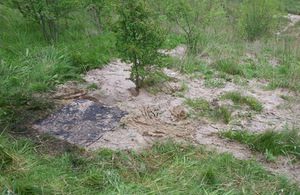Pollution incidents occurred on three separate occasions
On 21 July 2016, at Nottingham Crown Court, Severn Trent Water Limited was fined £426,000, ordered to pay Environment Agency Costs of £38,642.60 as well as a victim surcharge of £120. Severn Trent Water had previously pleaded guilty to the charges at Nottingham Magistrates Court on 25 November 2015.

Proceedings were brought by the Environment Agency following repeated pollution incidents where crude sewage leaked into the Shire Brook on the border of Derbyshire and Nottinghamshire on three separate occasions. The incidents occurred on 9 May 2013, 17 December 2013 and 29 April 2014.
The Severn Trent sewer that transported raw sewage had backed up and leaked into the surface water drain that led to the Shire Brook on the first two occasions. The April 2014 leak saw thick sewage sludge and solids on the hillside, ‘sewage pools’ at ground level and grey water and sewage fungus in the brook. This was due to a blocked combined sewer.
In passing sentence, the Judge stated in respect of incident 1 that it was not sufficient for Severn Trent Water to rely on the absence of any previous incident to negate the need for any further action. There was a known risk and Severn Trent’s approach was insufficiently proactive. There was a degree of past economic benefit to Severn Trent. There was a significant effect on the water quality, however it was short-lived in time. In respect of incident three, there was a failure by Severn Trent as a whole to take reasonable care and enforce proper systems for avoiding the commission of this offence. They were therefore negligent. The risks were entirely foreseeable and Severn Trent did not proactively investigate the sewers in response.
In mitigation the Judge found that Severn Trent had expressed regret and apologised for the three incidents. On each occasion the company had enacted a swift and effective clean-up operation.
Speaking after the case, an Environment Agency officer involved with the investigation said:
“Severn Trent Water has a responsibility to inspect and maintain its sewers, and the discharge of raw sewage into the same brook three times within 12 months is more than unfortunate.
“This is one of the largest fines ever to be imposed on Severn Trent and I hope it sends a strong message that it is far more cost effective to avoid these incidents, as we will continue to take action against companies and individuals where they ignore their responsibilities.”
In the last financial year Severn Trent’s turnover increased from £1.5 billion to £1.8 billion, with a pre-tax and interest profit of £512.6 million. The fines imposed were outside the ranges suggested within Sentencing Councils Guidelines in order to send out the necessary message to Severn Trent Water and its shareholders.







